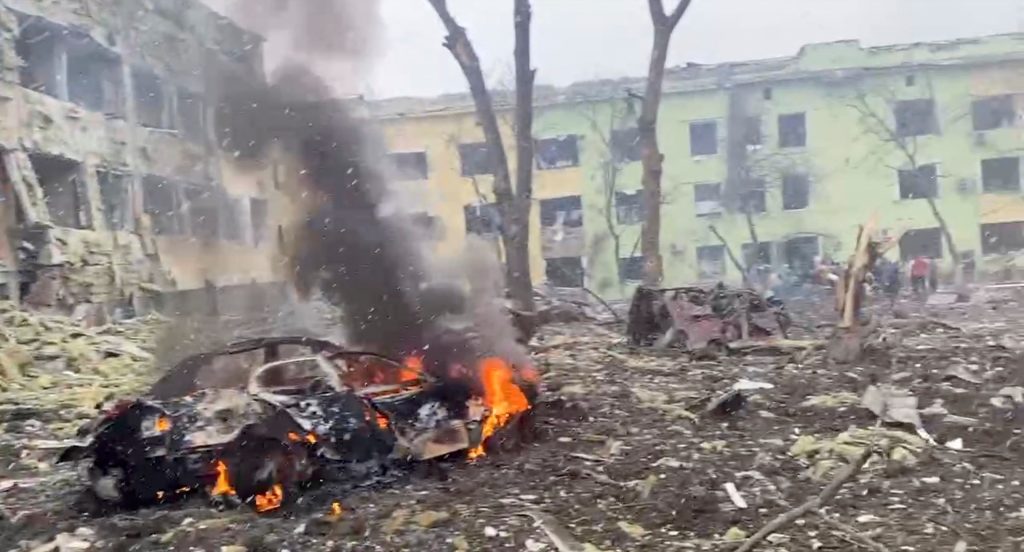As Russia expands its assault on Ukraine, the Atlantic Council’s Digital Forensic Research Lab (DFRLab) is keeping a close eye on Russia’s movements across the military, cyber, and information domains. With more than five years of experience monitoring the situation in Ukraine, as well as Russia’s use of propaganda and disinformation to undermine the US, NATO, and the European Union, DFRLab’s global team presents the latest installment of the Russian War Report.
Security
Putin endorses plan to bring 16,000 “volunteers” from the Middle East to fight in Ukraine
Tracking narratives
Russia spreads conspiracies about US and Ukraine biological weapons program
Memes and sarcasm on Russian social media after Lavrov claims Russia “didn’t attack Ukraine“
Pro-Kremlin Ukrainian Telegram channels paint Ukraine’s Western allies as untrustworthy
Media policy
Russia blocks access to Instagram, citing misleading Reuters headline
Documenting dissent
Georgian leader of anti-Russian protests sentenced to four days in prison
War crimes and human rights abuses
Kremlin attempts to justify attack on maternity hospital in Mariupol
International relations
Putin endorses plan to bring 16,000 “volunteers” from the Middle East to fight in Ukraine
During a March 11 meeting of Russia’s Security Council, Defense Minister Sergei Shoigu announced that more than 16,000 “volunteers” from the Middle East had expressed interest in joining Russia’s “liberation movement” for the People’s Republics of Donetsk and Luhansk. He emphasized that they are not financially motivated and are participating on a voluntary basis. Shoigu said many of the volunteers fought alongside Russia in the fight against ISIS.
In response to Shoigu’s announcement, Russian President Vladimir Putin said that if people from the Middle East want to help the people in the Donbas voluntarily and are not interested in money, then Russia should facilitate their deployment to the combat zone. He also slammed Western countries for permitting “mercenaries” to join the conflict on the Ukrainian side and accused them of violating international law.
The Pentagon previously reported that Russia is trying to recruit people from Syria to fight in Ukraine. The Wall Street Journal noted that Syrian soldiers are already fighting in Ukraine alongside Russians but did not specify how many fighters have been deployed. Syrian outlet DeirEzzor24 wrote that Russia is seeking fighters for six-month contracts and offering a salary of $200 to $300 per month.
—Givi Gigitashvili, Research Associate, Warsaw, Poland
Russia spreads conspiracies about US and Ukraine biological weapons program
On March 10, Igor Kirillov, the head of the Russian Armed Forces’ nuclear, chemical, and biological defense, once again accused Ukraine and the United States of working together to develop biological weapons. The latest version of this narrative began on March 6, when Russia’s Ministry of Defense claimed it had obtained documentary proof that the US and Ukraine collaborating to develop biological weapons.
Igor Kirillov said that the obtained documents revealed that more than 140 containers of ectoparasites of bats were transferred overseas from a biological laboratory in Kharkiv. He said that all high-risk research occurring in Ukraine’s biological laboratories is conducted under the guidance of US specialists, and that the US is interested in studying bats as biological weapons. Referring to the obtained documents, Kirillov said that the US spent $1.6 million in Ukrainian labs to study the transmission of infections by migratory birds. Kirillov added that in addition to Ukraine, the project is implemented in “Georgian biological laboratories controlled by the Pentagon,” claiming that the research is being conducted “in the immediate vicinity of the borders of Russia.” Kirillov also blamed Ukraine and the US for the COVID-19 outbreak.
That same day, Russian Foreign Minister of Sergei Lavrov demanded explanations for “US biological activities in Ukraine.” Lavrov claimed that “the Pentagon has created several dozen military biological laboratories on Ukrainian territory, as part of its program to create such military-biological laboratories around the world, in violation of the relevant convention on the prohibition of biological, toxin weapons.” Russia’s top diplomat also said that experiments in Ukrainian laboratories were not peaceful but aimed at creating “ethnically oriented” biological weapons.
Avril Haines, the US Director of National Intelligence, responded by explaining that there is a difference between a biological weapons lab and labs created for public safety and biodefense, noting that the latter are intended to ensure an adequate and efficient public health response during health emergencies like COVID-19. Haines said Ukraine operates a dozen biological research labs for public health purposes, and the US has provided bio-safety assistance. “We do not assess that Ukraine is pursuing either biological weapons or nuclear weapons, which have been some of the propaganda that Russia is putting out,” she said.
China has echoed Russia’s false claims about the US-run biological weapons labs in Ukraine. The US Department of Defense has denied the allegations, stating that Russia and China are “falsely accusing use of biological weapons against Russians.”
“There are five biological research laboratories in Kyiv,” Pentagon officials added. “Their work focuses on diagnostics, therapeutics, treatments, prevention, and vaccines, not on military use as the Russians and Chinese accuse.”
—Eto Buziashvili, Research Associate, Tbilisi, Georgia
—Sopo Gelava, Research Associate, Tbilisi, Georgia
Memes and sarcasm on Russian social media after Lavrov claims Russia “didn’t attack Ukraine“
At a March 10 press conference, Russian Foreign Minister Sergei Lavrov declared, “We are not planning to attack other countries. We didn’t attack Ukraine, either.” This denial comes after Lavrov participated in unsuccessful ceasefire negotiations with his Ukrainian counterpart Dmytro Kuleba in Turkey.
Lavrov’s claim that Russia did not attack Ukraine was covered by pro–Kremlin and Belarusian media, in addition to Ukrainian and foreign media. The statement also inspired several memes on Facebook, which was recently banned in Russia.
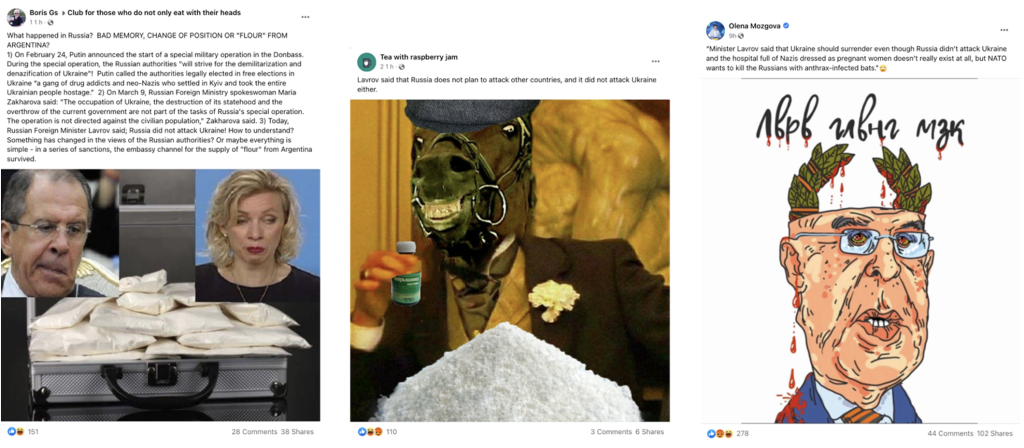
Screenshots of memes on Facebook about Lavrov’s statement, translated from Russian. (Source: Boris Gs, left; Tea with raspberry jam, middle; Olena Mozgova, right)
On the popular Russian social media platform VKontakte (VK), some users expressed support for Lavrov while others used sarcasm to describe the absurdity of the statement. Pro-Kremlin pages posted identical messages in support of Lavrov. In the comments, users wished Lavrov and other Kremlin leadership God’s blessing and good health, and expressed pride about being represented by Lavrov and other Kremlin officials. Few comments directly addressed Russia’s statement denying the war in Ukraine.
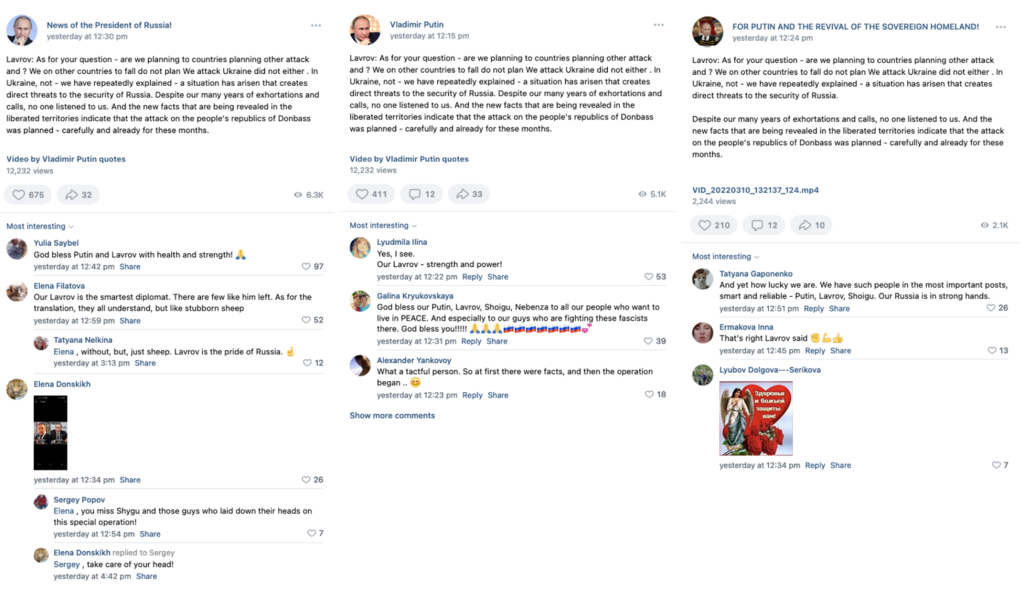
Screenshots of identical posts from pro-Kremlin pages on VKontakte (translated from Russian). (Source: News of the President of Russia/archive, left; Vladimir Putin/archive, middle; FOR PUTIN AND THE REVIVAL OF THE SOVEREGN HOMELAND!/archive, right)
Pro-Kremlin outlets reporting Lavrov’s remarks on VKontakte received sarcastic user comments. For example, one commenter wrote, “Black is white. War is peace. 2×2=5,” while another said, “War is peace, ignorance is strength, freedom is slavery.” Some comments on these posts suggested Lavrov was using drugs.
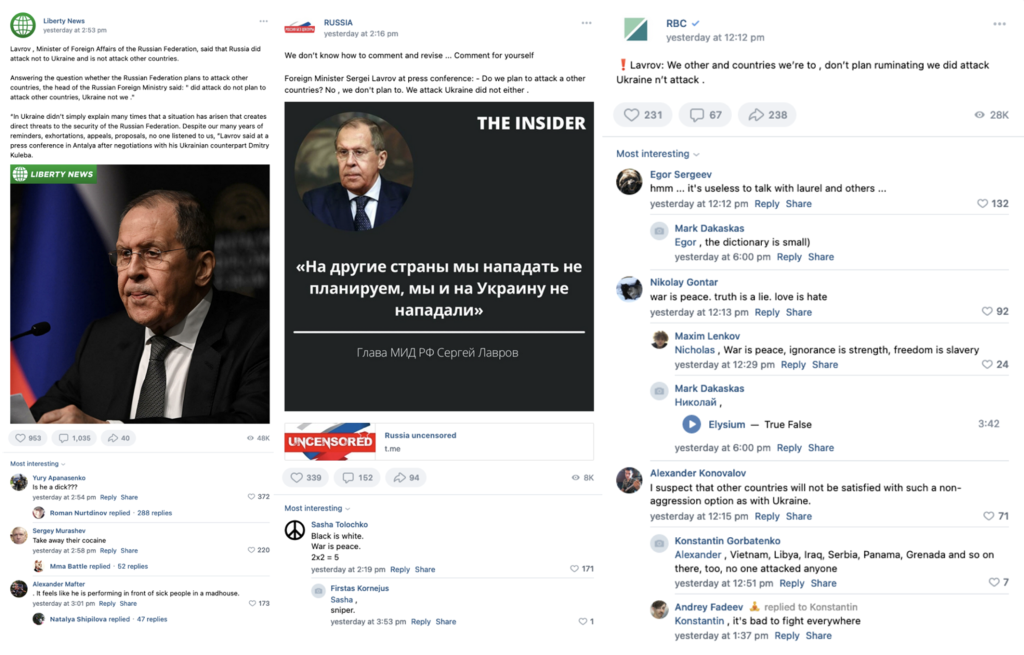
—Nika Aleksejeva, Lead Researcher, Riga, Latvia
Pro-Kremlin Ukrainian Telegram channels paint Ukraine’s Western allies as untrustworthy
Ukrainian Telegram channels linked to the Kremlin continue to publish reports that seek to undermine trust in Western countries allied with Ukraine. For example, the Kremlin-tied channel Rezident wrote that the West has distanced itself from Ukraine, and condemned the European Union for not transferring frozen funds from the Russian Central Bank to Ukraine. Another Kremlin-associated channel, ZeRada, claimed that Western countries would prefer to appropriate the frozen funds for themselves rather than give them to Ukraine.
Another post in the Rezident channel also claimed that Western countries would not accept Ukraine into the EU because it would force EU countries to pay for Ukraine’s recovery. The post noted that NATO won’t provide fighter jets and refuses to enact a no-fly zone over Ukraine. “The bottom line, Ukraine received a destroyed country and empty promises of help,” they added. The channel does not mention that the EU and NATO have imposed severe sanctions on Russia and sent weapons and humanitarian aid to Ukraine.
In another message, Rezident wrote that the EU “does not want to impose new sanctions and provide real help,” arguing that Ukraine should base its foreign policy decisions on the “axiom” that “no one wants to accept us to the European Union.”
—Roman Osadchuk, Research Associate
Russia blocks access to Instagram, citing misleading Reuters headline
The Russian state censor has announced a ban on Instagram, effective March 14. The ban follows an announcement that the Russian Prosecutor’s Office had requested that Meta, the parent company of Instagram, be declared an “extremist organization.” Instagram has long been a popular service in Russia; this move represents a significant curtailment of Russian digital life and a far more consequential move than the Russian ban on Facebook instituted last week. Meta’s remaining platform, WhatsApp, will remain operational in Russia for now. Some observers speculate that, because WhatsApp constitutes an estimated 60 percent of messenger activity in the country, Russia is not yet in a position to implement or enforce such a ban.
The immediate impetus for the Instagram ban was a story, first published by Reuters, which found that Meta has temporarily relaxed its prohibition against calls to violence in Ukraine and the Baltic States. Users of Facebook and other Meta platforms may issue unspecific calls for violence (i.e. no evidence of specific planning) against Russian soldiers and against Vladimir Putin and Alyaksandr Lukashenka. They may also issue calls for violence against “Russians” when the context is understood to be Russian soldiers. They may not issue calls for violence against Russian civilians, nor circulate content that dehumanizes Russians as a nationality or ethnicity.
Reuters initially ran this story with the headline, “Facebook and Instagram to temporarily allow calls for violence against Russians, calls for Putin’s death.” This headline provoked widespread outrage among human rights activists and Russian immigrants and expatriates, who assumed that this was a generalized policy of xenophobia. Reuters later amended the headline to read, “Facebook temporarily allows posts on Ukraine war calling for violence against invading Russians or Putin’s death”—a distinction lost on the tens of thousands of people who had already reacted to the article.
While Russia appears to have been preparing to institute an Instagram block for some time, it leapt on the opportunity provided by the Reuters headline. The subsequent Reuters correction, as well as the specifics of Meta’s policy, have gone unmentioned by Russian state media.
—Emerson Brooking, Resident Senior Fellow, Washington, DC
As international sanctions restrict the global internet, civil society urges for clarity, transparency, and caution
The invasion of Ukraine has accelerated the norms surrounding content moderation and content removal, with several technology platforms around the world continuing to take voluntary actions to de-rank, label, and de-monetize conflict-related content. Further, some internet infrastructure companies have terminated all business and sales in Russia citing US sanctions, while others are severing ties to sanctioned entities and users.
Increasingly, government sanctions are playing a role in both content moderation decisions, and corporate operations servicing Russian users; in absence of clear implementation rules, civil society coalitions and experts are calling for greater clarity, transparency, and a proactive effort to prevent the splintering of the global internet. On March 10, civil society organizations published an open letter calling on the Biden Administration and other governments to carefully weigh measures that could restrict the Russian public’s access to the internet, noting the need for clear carve outs to sustain online civic spaces, support for digital security and independent media, and human rights-based assessments of the impact of domestic tech regulation on international users.
—Jacqueline Malaret, Assistant Director, Washington, DC
Georgian leader of anti-Russian protests sentenced to four days in prison
Shota Dighmelashvili, a leader of the Shame Movement, a group of activists organizing anti-Russian and pro-Ukrainian protests in Georgia, has been sentenced to four days in prison. Open Caucasus Media reported that police detained Dighmelashvili on March 8, after he threw an egg at a government administration building in Tbilisi. The previous day, Georgian residents took to the streets to demand the cancelation of the visa-free regime for Russians, a ban on Russian state-affiliated media, and the closing Georgian airspace to Russian planes.
—Sopo Gelava, Research Associate, Tbilisi, Georgia
Kremlin attempts to justify attack on maternity hospital in Mariupol
As widely reported this week, Russian forces bombed the Mariupol Territorial Medical Association of Child and Women’s Health hospital on March 9. While Russia did not deny the attack, it claimed militants had taken over the hospital. According to Foreign Minister Sergey Lavrov, “This maternity hospital was long captured by Azov Battalion and other radicals. All pregnant women, nurses, and other personnel were kicked out. It was an ultraradical Azov battalion base. We got this data three days ago.”
Multiple pro–Kremlin and Kremlin–owned media outlets published alleged debunks of the bombing to justify the atrocity. Kremlin-controlled media reported on March 5 that Ukrainian soldiers from the Azov Battalion had established their base in maternity house number one. The bombed building is a separate building formerly known as children’s hospital number three.
Kremlin-controlled media also accused Marianna Vyshemirskaya, a beauty blogger from Mariupol, of playing a victim in an allegedly staged rescue operation. In an article published by Mariupol regional media outlet 0629.com.ua, Vyshemirskaya’s friends explained how she had arrived at the hospital for an ultrasound prior to the bombing. “Marianna found a good doctor in a maternity hospital on the left coast of Mariupol, she had to give birth there,” one of them explained. “But on the day when she was supposed to go there for the last ultrasound scan, shelling began, and there were explosions.”
Additionally, pro-Kremlin KP.ru and REN TV falsely claimed that Vyshemirskaya had changed outfits and put on make-up to play two different victims. REN TV went so far as to make a side-by-side comparison of photos of two pregnant women, claiming both were Vyshemirskaya.
In two photos taken after the blast, Vyshemirskaya is clearly seen with consistent facial bruises and carrying the same blanket.
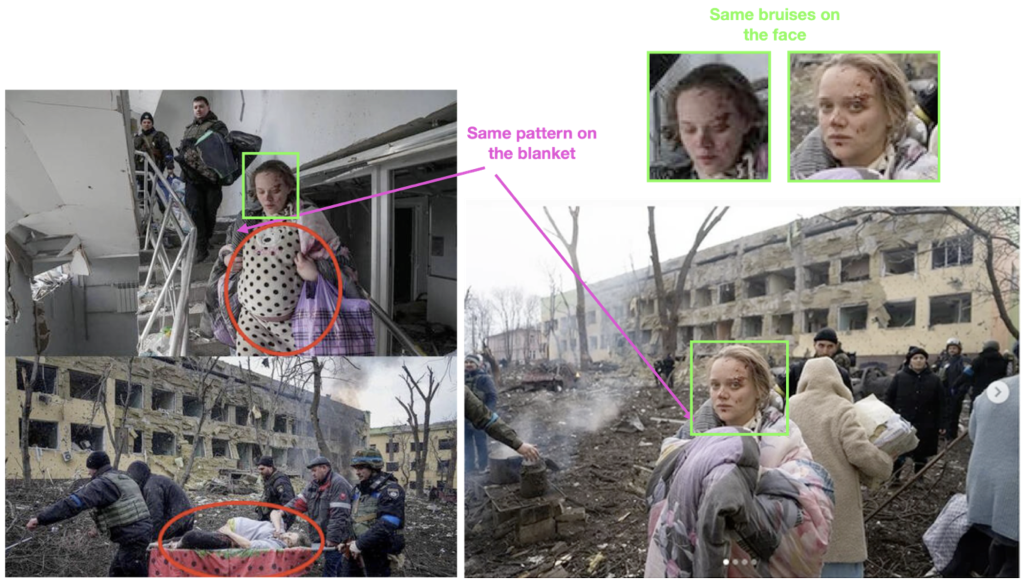
—Nika Aleksejeva, Lead Researcher, Riga, Latvia
Georgia’s pro-Kremlin political parties call on UN Security Council to support neutral status of Georgia and Ukraine
Irma Inashvili, the leader of the pro-Kremlin Georgian political party Alliance of Patriots, published an open letter on March 10 addressing the UN Security Council. The letter, signed by fifty-five pro-Kremlin organizations, called on the UN Security Council to support Georgia and Ukraine becoming neutral.
“The tragic conflict in Ukraine clearly shows that neutrality is the best solution for the countries like Georgia and Ukraine, especially taking into account the fact that the President of the Russian Federation Vladimir Putin repeatedly stated that the neutrality is the best solution for Ukraine,” said the letter.
On February 21, three days before Russia invaded Ukraine, the same group of pro-Kremlin organizations addressed Vladimir Putin and called on the Georgian government to announce its neutrality.
—Sopo Gelava, Research Associate, Tbilisi, Georgia
Image: A car burns after the destruction of Mariupol children's hospital as Russia's invasion of Ukraine continues, in Mariupol, Ukraine, March 9, 2022 in this still image from a handout video obtained by Reuters. Ukraine Military/Handout via REUTERS THIS IMAGE HAS BEEN SUPPLIED BY A THIRD PARTY.
